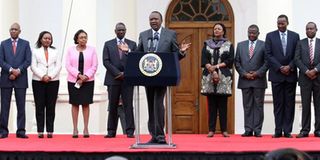Intimidating NGOs won’t help fight graft

President Uhuru Kenyatta addresses the media at State House, Nairobi, on July 21, 2015. President Kenyatta must fight corruption in his government and also create the political atmosphere to engender support among the public for the fight against the vice. PHOTO | JEFF ANGOTE |
What you need to know:
With rising interest rates hurting most households and economic growth projections being revised by the day, Kenyans can no longer afford to laugh at self-inflicted pain such as biro pens that cost almost Sh10,000.
The key issue of concern is the on-going intra-elite struggle to control the taps of corruption and illicit enrichment.
After the Anglo-Leasing scandal, the Kibaki regime was prompted into action by the activities of civil society and the media.
Using the John Githongo dossier on Anglo Leasing as the launch pad, Nascon upped the anti-corruption rhetoric in the country and initiated a massive citizen mobilisation campaign.
President Uhuru Kenyatta must not only fight corruption in the ranks of his government, he must also create the political atmosphere necessary to engender support among the public for the fight against the vice.
The President needs to urgently get past the small matter of Cabinet Secretary Anne Waiguru.
Fighting corruption is now a matter of life and death for Kenya.
With rising interest rates hurting most households and economic growth projections being revised by the day, Kenyans can no longer afford to laugh at self-inflicted pain such as biro pens that cost almost Sh10,000.
CRIPLLING CIVIL SOCEITY
A sub-text to the fight against corruption is the role of non-State actors in the unfolding situation.
Since it came to power, the Jubilee administration has tried to cripple civil society.
This has been done through threats and negative profiling of individual actors, dispatch of auditors to select organisations that the government does not like and attempts to legally close up the political and operational space for civil society.
At first, the quarrel was purportedly because of the role civil society played in the ICC issue.
TAPS OF CORRUPTION
Civil society organisations were accused of procuring witnesses for the ICC.
However, it has now become apparent that the issue at stake is control of the billions that come into the sector every year.
The key issue of concern is the on-going intra-elite struggle to control the taps of corruption and illicit enrichment.
The key actors are Cabinet secretaries under whose dockets massive looting is going on.
The fight against independent voices, especially civil society and the media, has been prompted by the need to loot public resources without having to face a public backlash.
NAME AND SHAME
After the Anglo-Leasing scandal, the Kibaki regime was prompted into action by the activities of civil society and the media.
Civil society was then organised under the Name and Shame Corruption Networks (Nascon) campaign launched in May 2005.
Using the John Githongo dossier on Anglo Leasing as the launch pad, Nascon upped the anti-corruption rhetoric in the country and initiated a massive citizen mobilisation campaign.
The second phase was the naming and shaming of the culprits of corruption.
This phase ended in a massive demonstration in the streets of Nairobi, which was followed in quick succession by the “resignation” of then Cabinet ministers Kiraitu Murungi, George Saitoti, and David Mwiraria.
The truth shall set you free, so the Holy Bible says.
President Kenyatta must now realise that the public will not continue to tolerate corruption.
And a genuine fight against corruption cannot be anchored while at the same time independent voices are being crippled.
Either you are fighting corruption or you are not.




